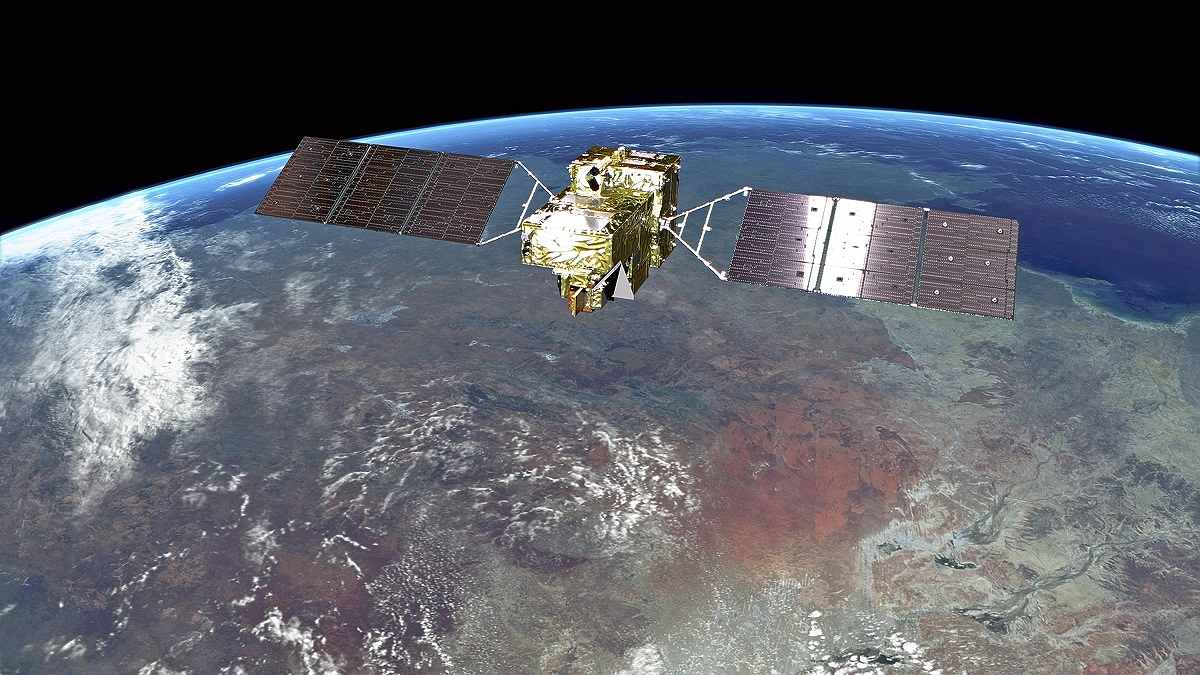
An artist’s rendering of greenhouse gas observation satellite Ibuki-2
6:00 JST, August 9, 2023
Japan eyes providing data from observation satellites measuring carbon dioxide emissions to developing countries for these nations to use when they submit their data to the secretariat of the U.N. Framework Convention on Climate Change.
The Environment Ministry intends to provide such data to developing countries as a way to make contributions in the climate change field.
Based on the Paris Agreement on measures to fight global warming that came into effect in 2016, each nation is required to periodically report on its emissions of greenhouse gases such as CO2 and methane to the convention’s secretariat.
Normally, this data is calculated based on information such as a nation’s energy consumption and industrial statistics.
For many developing countries, however, there are issues such as the low credibility of their statistics or the lack of technology to measure emissions.
The ministry along with the Japan Aerospace Exploration Agency and other entities have been accumulating technology to estimate the emissions of CO2, which accounts for the largest volume of greenhouse gases. In 2009, Japan launched the Ibuki observation satellite, then in 2018 it launched the Ibuki-2.
Since fiscal 2018, the ministry has been cooperating with Chuo University in promoting a feasibility test in Mongolia to enhance the accuracy of CO2 emissions estimates.
With the accuracy having now reached a level good enough for practical use, the Mongolian government intends to include this CO2 emissions data in its report to be submitted to the convention’s secretariat as soon as sometime this year.
“It is possible to ensure the transparency of emissions of each developing country by using satellite data,” said Masataka Watanabe, a professor of global environmental science at Chuo University. “Japan should start with the Mongolia case to expand such efforts.”
The ministry has exchanged memorandums with the Central Asian countries of Uzbekistan and Kazakhstan that Japan will provide them with the measurements made by its satellites, and Kyrgyzstan is among three countries that are in favor of using the data.
At a future date, Japan also aims to provide such data to India, one of the major emitters of CO2 in the world.
A new type of observation satellite with advanced sensors will be launched in fiscal 2024 as a successor to Ibuki-2.
Top Articles in Science & Nature
-

Japan Institute to Use Domestic Commercial Optical Lattice Clock to Set Japan Standard Time
-

Japan to Face Shortfall of 3.39 Million Workers in AI, Robotics in 2040; Clerical Workers Seen to Be in Surplus
-

Record 700 Startups to Gather at SusHi Tech Tokyo in April; Event Will Center on Themes Like Artificial Intelligence and Robotics
-

iPS Treatments Pass Key Milestone, but Broader Applications Far from Guaranteed
-

iPS Cell Products for Parkinson’s, Heart Disease OK’d for Commercialization by Japan Health Ministry Panel
JN ACCESS RANKING
-

Japan PM Takaichi’s Cabinet Resigns en Masse
-

Japan Institute to Use Domestic Commercial Optical Lattice Clock to Set Japan Standard Time
-

Israeli Ambassador to Japan Speaks about Japan’s Role in the Reconstruction of Gaza
-

Man Infected with Measles Reportedly Dined at Restaurant in Tokyo Station
-

Videos Plagiarized, Reposted with False Subtitles Claiming ‘Ryukyu Belongs to China’; Anti-China False Information Also Posted in Japan





















